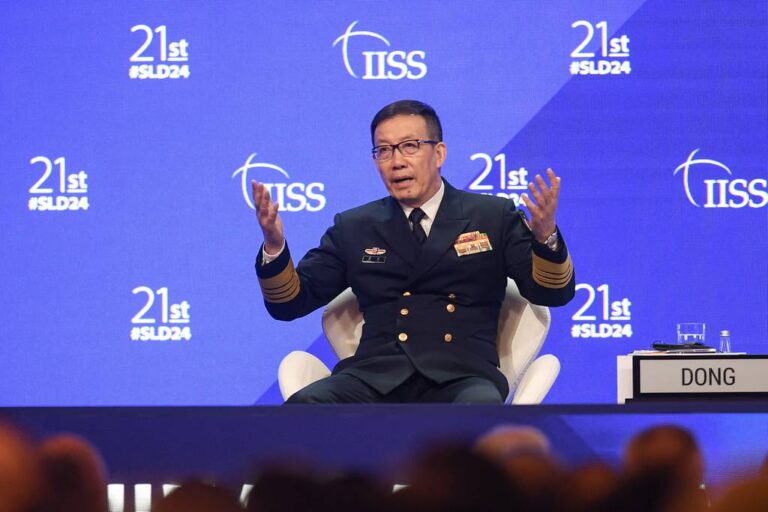SINGAPORE — After his first meeting with U.S. Defense Secretary Lloyd Austin, China’s new defence minister paused in an outdoor corridor to wipe the fog from his glasses.
Standing near the reporters, Admiral Dong Jun smiled and explained to a member of the U.S. delegation what he thought were the best places to see pandas in China. It was diplomacy in action.
Two days later, Don’s tone changed.
Tung delivered a stern and sometimes fiery speech on the final day of the Shangri-La Dialogue, a defense summit bringing together government officials from across the region in Singapore, in which he warned that anyone who supports independence for Taiwan, a rogue province in the eyes of China’s leaders, would face “self-destruction”.
At another time, he said the chances of “peaceful reunification” with the island nation were “diminishing.”
These two moments are emblematic of China’s goals at the summit and, by extension, the reputation it seeks in the region. China appears to be there to reassure others that it is acting responsibly — after all, it has resumed top military talks with the United States.
But at the same time, China sent a message of enforcement regarding Taiwan and Chinese interests in the South China Sea. After coming under criticism from neighbours during the summit, Dong’s speech signalled China’s tougher stance on sensitive issues.
“This was the most consistently coercive speech we’ve heard from China at the Shangri-La Dialogue,” Rory Medcalf, head of the Australian National University’s School of National Security Studies, wrote on X.
“Tighter scrutiny”
US officials agreed with the post and called the speech “insensitive”.
“Countries in the region and around the world have serious concerns about coercive violence. [Chinese] The official, speaking on condition of anonymity because of the sensitivity of the issue, spoke about “Chinese military activities in the East China Sea, South China Sea, Taiwan Strait and beyond.”
This was a reference to Chinese military activity around Second Thomas Shoal, a South China Sea reef where the Philippines has a base. China and the Philippines are among several countries that claim sovereignty over local geographic features.
China Coast Guard vessels have been harassing Philippine ships for months on replenishment missions, at times firing water cannons to disable the vessels.
Two days before Dong’s speech, Philippine President Ferdinand Marcos Jr. warned that any Filipino deaths from such actions would be considered an act of war, a decision that could draw the United States, with which the Philippines has a mutual defense treaty, into the conflict.
But Mr Marcos was not the only one to have tough words for China at the meeting, with Mr Austin repeating the Pentagon’s assertion that conflict is “neither imminent nor inevitable”.
Australian Defense Minister Richard Marles also said: “As China assumes a larger role, it must accept that, like any great power, its use of power will be subject to greater scrutiny.”
Two years ago, China ended military talks with the United States after then-House Speaker Nancy Pelosi (D-Calif.) visited Taiwan, a suspension that unnerved some attendees at last year’s Shangri-La Dialogue, when China’s then-defense minister turned down an offer to meet with U.S. defense officials.
Those talks resumed after a summit between U.S. President Joe Biden and his Chinese counterpart Xi Jinping in November, and Dong spoke at length about the value of communication in his speech.
“The Chinese military will never act from a position of strength in its relations with foreign militaries,” Dong said. “At the same time, we should not expect other countries to impose their will on us.”
Words and actions
But as an audience member pointed out to Dong during the question-and-answer session, these signals often do not match China’s actions.
The meeting comes a week after China launched a series of military drills around Taiwan that China has described as “punitive” in response to a speech by the island’s new president, who some in Beijing see as a supporter of independence.
In his speech, Tung cited “external interfering forces” – a euphemism for the United States and other allies – as the cause of tensions in the South China Sea and Taiwan.
After his speech, the minister did not answer questions about China’s role in the war between Russia and Ukraine or in the war between Israel and Hamas in the Gaza Strip, but spoke for more than 10 minutes about those who claim to be seeking “gradual” independence for Taiwan.
“They continue to test China’s red lines,” he said, referring to arms sales and “official events,” presumably a reference to lawmakers who recently visited Taiwan.
When the conference moderator took some important questions from the audience, Dong attempted a little joke.
“I feel the appeal of the Shangri-La Dialogue,” he said.
Noah Robertson is a Pentagon reporter for Defense News. He previously covered national security for The Christian Science Monitor. He earned a bachelor’s degree in English and political science from the College of William and Mary in his hometown of Williamsburg, Virginia.

